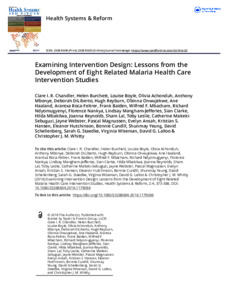CHANDLER, Clare IR, BURCHETT, Helen, BOYLE, Louise, ACHONDUH, Olivia, MBONYE, Anthony, DILIBERTO, Deborah, REYBURN, Hugh, ONWUJEKWE, Obinna, HAALAND, Ane, ROCA-FELTRER, Arantxa, BAIDEN, Frank, MBACHAM, Wilfred F, NDYOMUGYENYI, Richard, NANKYA, Florence, MANGHAM-JEFFERIES, Lindsay, CLARKE, Sian, MBAKILWA, Hilda, REYNOLDS, Joanna, LAL, Sham, LESLIE, Toby, MAITEKI-SEBUGUZI, Catherine, WEBSTER, Jayne, MAGNUSSEN, Pascal, ANSAH, Evelyn, HANSEN, Kristian S, HUTCHINSON, Eleanor, CUNDILL, Bonnie, YEUNG, Shunmay, SCHELLENBERG, David, STAEDKE, Sarah G, WISEMAN, Virginia, LALLOO, David G and WHITTY, Christopher JM
(2016).
Examining Intervention Design: Lessons from the Development of Eight Related Malaria Health Care Intervention Studies.
Health systems and reform, 2 (4), 373-388.
[Article]
Documents
30950:616827
![[thumbnail of Reynolds-ExaniningInterventionDesign(VoR).pdf]](https://shura.shu.ac.uk/30950/1.hassmallThumbnailVersion/Reynolds-ExaniningInterventionDesign%28VoR%29.pdf)

Preview
Abstract
Rigorous evidence of "what works" to improve health care is in demand, but methods for the development of interventions have not been scrutinized in the same ways as methods for evaluation. This article presents and examines intervention development processes of eight malaria health care interventions in East and West Africa. A case study approach was used to draw out experiences and insights from multidisciplinary teams who undertook to design and evaluate these studies. Four steps appeared necessary for intervention design: (1) definition of scope, with reference to evaluation possibilities; (2) research to inform design, including evidence and theory reviews and empirical formative research; (3) intervention design, including consideration and selection of approaches and development of activities and materials; and (4) refining and finalizing the intervention, incorporating piloting and pretesting. Alongside these steps, projects produced theories, explicitly or implicitly, about (1) intended pathways of change and (2) how their intervention would be implemented.The work required to design interventions that meet and contribute to current standards of evidence should not be underestimated. Furthermore, the process should be recognized not only as technical but as the result of micro and macro social, political, and economic contexts, which should be acknowledged and documented in order to infer generalizability. Reporting of interventions should go beyond descriptions of final intervention components or techniques to encompass the development process. The role that evaluation possibilities play in intervention design should be brought to the fore in debates over health care improvement.
Actions (login required)
 |
View Item |



 Tools
Tools Tools
Tools